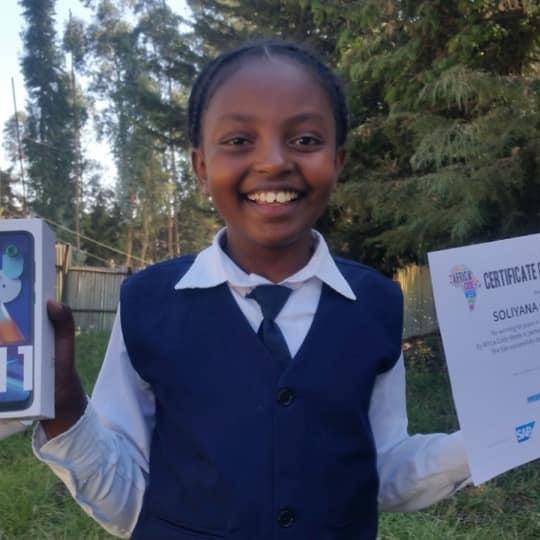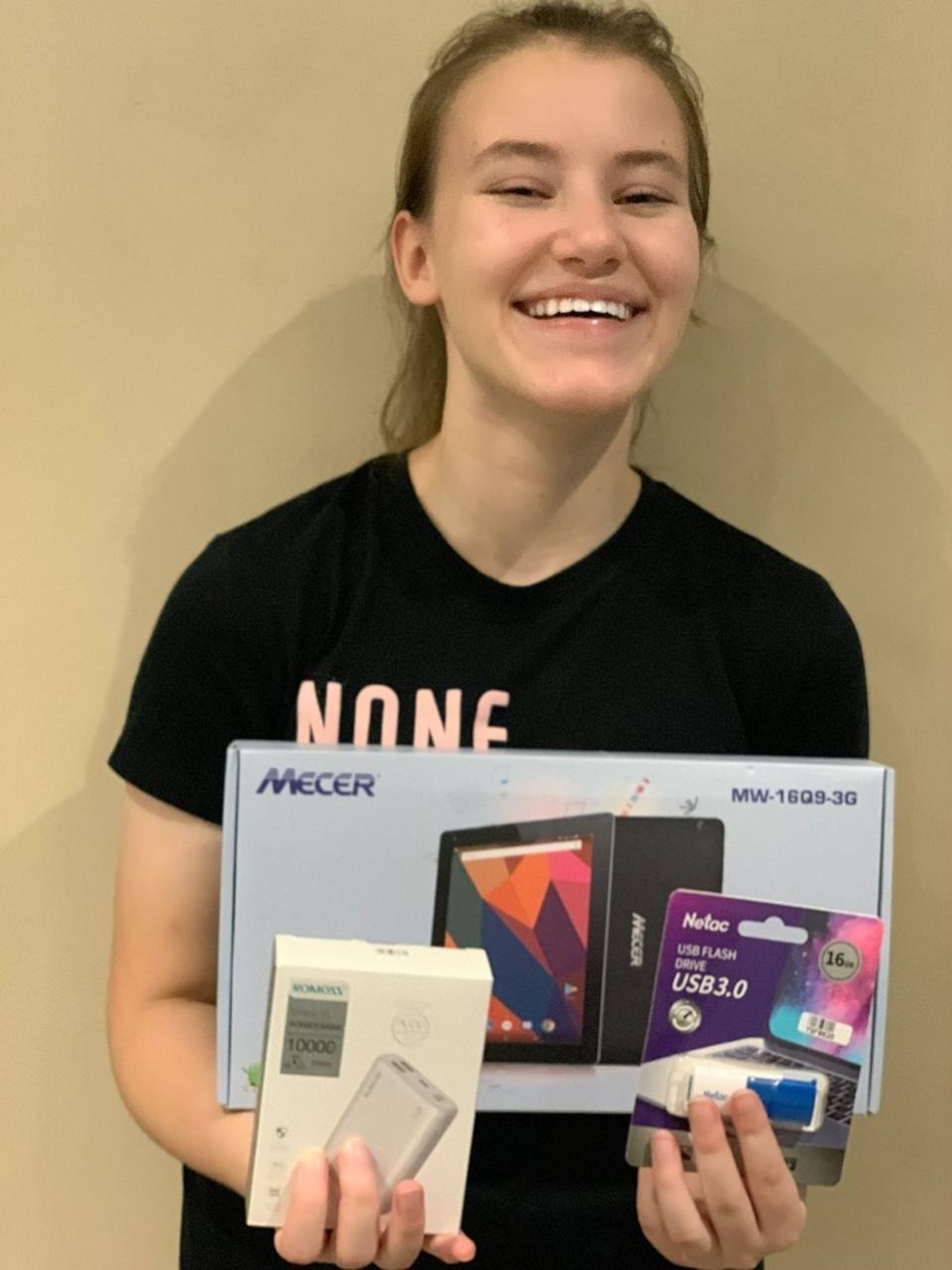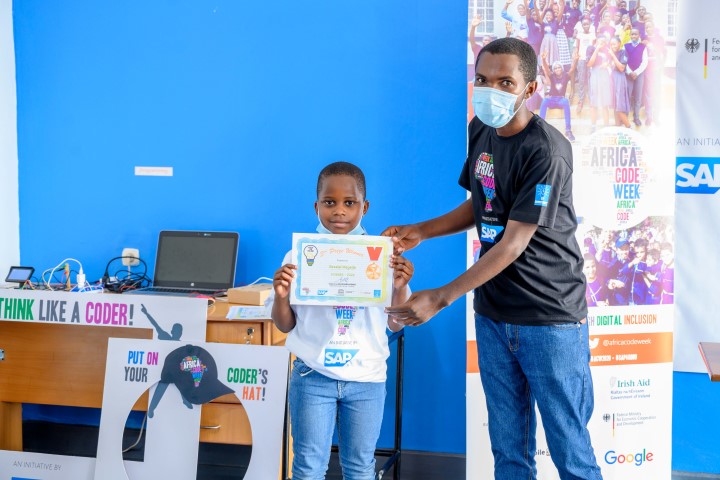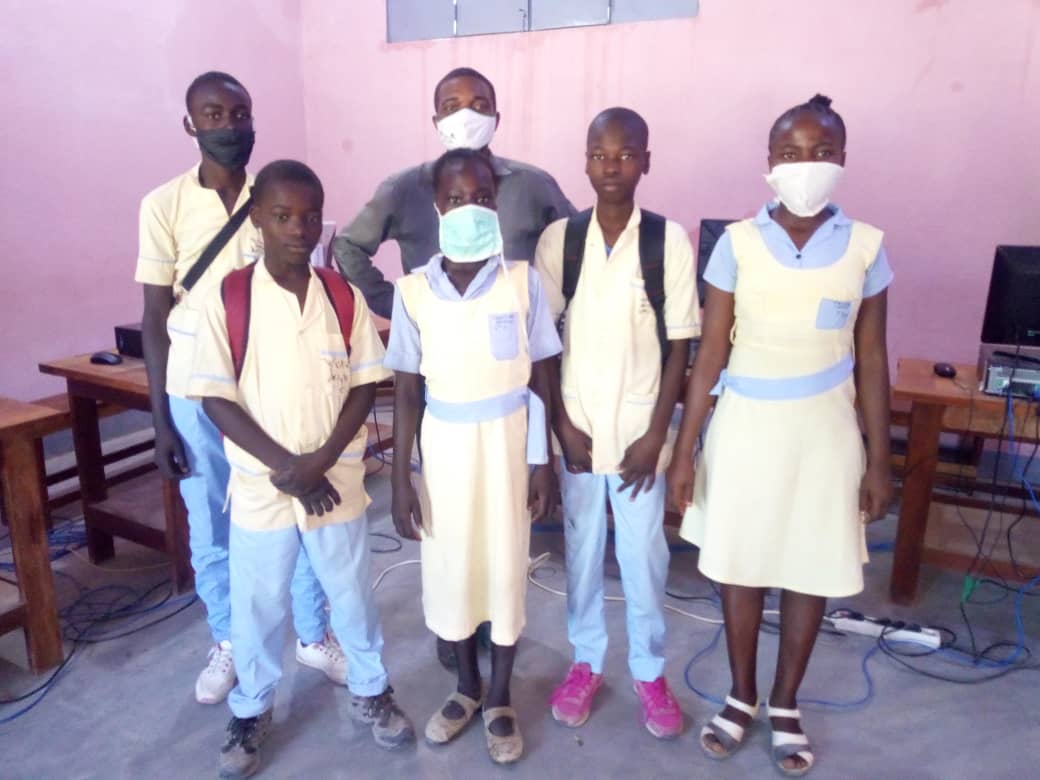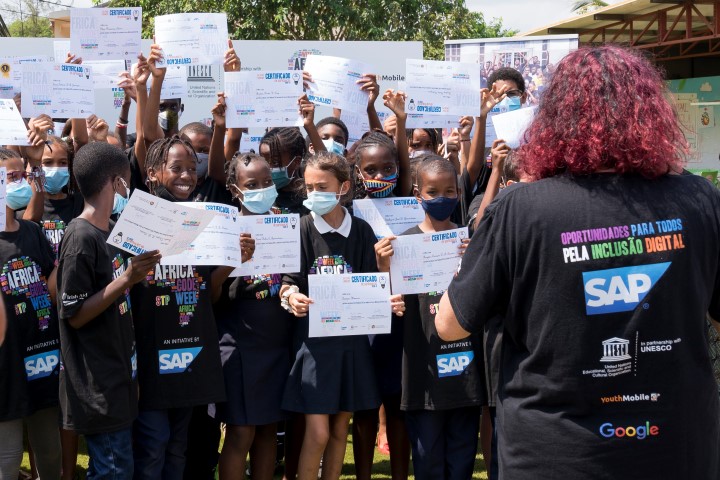Version française ci-dessous
After a rigorous round of judging for this year’s AfriCAN Code Challenge, SAP Africa Code Week’s top 10 winners were announced and special highlights include the top 3 being all-female, aged 10 - 16 years, with Soliyana, 10 years old from Ethiopia as the Pan-African winner of the competition.
"Despite the COVID disruption for schools which impacted hundreds of millions of youth across Africa, children from more than 54 countries stepped-up to share their vision of the future of education,” says Africa Code Week’s Global Coordinator, Olajide Ademola Ajayi.
Ajayi continues to say that the youth engagement throughout the challenge was incredibly inspiring, “While there can ultimately be only one winner, the quality of entries at the inaugural AfriCAN Code Challenge encouraged hope and confidence for Africa's future, shaped by the largest youth population in the world."
Launched by SAP Africa Code Week and partners UNESCO, Irish Aid, the Association for the Development of Education in Africa (ADEA) and Jokkolabs in September 2020, the AfriCAN Code Challenge is a pan-African coding competition where youth aged 8 - 16 were tasked with coding a game using the Scratch programming language to answer the question: "How will your tech change the future of education?"
During the AfriCAN Code Challenge youth were able to enter alone or in teams of up to five people, and entries featured a two-minute YouTube clip showcasing how their game works and why it should be considered a winning entry. The unique initiative and entry mechanism called upon the children’s ability to design a project that would solve a community-issue, code it, and communicate it.
During the opening rounds of the challenge, participation reached across 40 countries and featured 100 project video clips, only the top three entries from 36 countries made it into the continental final, followed by 22 countries in the final judging stage.
Selected by a high-level jury composed of key Africa Code Week delegates and STEM education experts, the top three of the AfriCAN Code Challenge is:
Followed by:
4th: Mauritius – Mr. E-Bin
5th: Nigeria – I-Learn
6th: Tunisia – Warrior
7th: Morocco – Abdelilah Hashas
8th: Zimbabwe – HeadStart Game
9th: Rwanda – Math Puzzles for Kids
10th: Ivory Coast – Easy Preterit
The jury also awarded two superior prizes for ‘Outstanding Government Support’ to Morocco and Nigeria, where the competition was implemented by the Ministries of Education, and received strong institutional support.
Claire Gillissen-Duval, Director of EMEA Corporate Social Responsibility and Co-founder of Africa Code Week at SAP celebrates the joyous occasion, “The all-female top three proves that the future of tech cannot be envisioned without girls. Once again, this year’s ACW initiative increased its female participation and these incredible achievements highlight the massive strides that SAP, partners and the ACW programme continue to make in closing gender gap and build an all-inclusive digital world.”
“In addition to the winners, we also give thanks to the ongoing support from Government, who join us on our digital journey and believe in the importance and relevance of 21st century learning for the development of native African excellence. The solid base of our partnership with the Moroccan and Nigerian Ministries of Education is the foundation of a successful model which we wish to replicate throughout Africa, to encourage governments to include computer coding in their national curricula.”
Gagnantes du concours AfriCAN Code Challenge : quand les filles utilisent la technologie pour changer l'avenir de l'éducation
Les jurés du concours ont finalement tranché : les 10 meilleurs projets du concours AfriCAN Challenge 2020 sont désormais connus! Les trois grandes gagnantes sont des jeunes femmes âgées de 10 à 16 ans, Soliyana en tête. A 10 ans, cette jeune Éthiopienne est la lauréate du concours à l’échelle panafricaine.
« Malgré les conséquences du COVID sur les écoles, touchant plusieurs centaines de millions de jeunes à travers l'Afrique, des jeunes d’une quarantaine de pays ont répondu à l’appel et nous ont fait part de leur vision de l'éducation de demain, » a déclaré Olajide Ademola Ajayi, Coordinateur mondial d’Africa Code Week. » Pour lui, l'implication des jeunes à chaque étape du concours est une grande source d’inspiration : « Bien qu'il ne puisse y avoir qu'un seul gagnant, la qualité des contributions à cette toute première édition du concours redonne espoir et confiance en l'avenir de l'Afrique, façonné dès aujourd’hui par la plus grande population de jeunes au monde. »
Lancé en septembre 2020 par SAP Africa Code Week et ses partenaires (l'UNESCO, Irish Aid, l'Association pour le développement de l'éducation en Afrique (ADEA) et Jokkolabs), l'AfriCAN Code Challenge est un concours de codage pour les jeunes de 8 à 16 ans. Leur mission consistait à programmer un jeu à l’aide de Scratch pour répondre au thème : "Comment ta technologie va-t-elle changer l'avenir de l'éducation ?
Les jeunes pouvaient participer seul ou en équipe de cinq personnes au maximum. A l’aide d’un clip YouTube de deux minutes, ils devaient expliquer le fonctionnement de leur jeu et en quoi il se démarque. Cette initiative unique fait ainsi appel à un large éventail de compétences, de la capacité des enfants à concevoir un projet et à résoudre un problème communautaire en passant par la programmation et la communication.
Des milliers de jeunes issus de 40 pays ont participé au premier tour, donnant lieu à une première sélection de 100 projets vidéo. Seuls les trois meilleurs projets de 36 pays ont été retenus pour la finale continentale, puis de 22 pays lors de la grande finale.
Sélectionnées par un jury de haut niveau composé de responsables SAP Africa Code Week, de partenaires et de pédagogues experts, les trois grandes gagnantes à l’échelle panafricaines sont :
Suivies de :
4ème: Maurice – Mr. E-Bin
5ème: Nigéria – I-Learn
6ème: Tunisie – Warrior
7ème: Maroc – Abdelilah Hashas
8ème: Zimbabwe – HeadStart Game
9ème: Rwanda – Math Puzzles for Kids
10ème: Côte d'Ivoire – Easy Preterit
Le jury a également décerné deux prix spéciaux intitulés "Soutien exceptionnel du gouvernement" au Maroc et au Nigéria, deux pays où le concours fut déployé par le Ministère de l'Education, bénéficiant ainsi d'un soutien institutionnel important.
Claire Gillissen-Duval, Directrice de la Responsabilité sociétale des entreprises pour la région EMEA et co-fondatrice d'Africa Code Week chez SAP, se félicite de cette réussite : « le palmarès féminin de ce concours prouve que l'avenir de la technologie ne saurait être envisagé sans les filles. Africa Code Week a de nouveau augmenté son taux de participation féminine cette année et ces incroyables réalisations soulignent les progrès considérables accomplis par SAP et ses partenaires dans le cadre d'Africa Code Week pour combler le fossé numérique et bâtir un monde numérique ouvert à toutes et à tous. »
« En plus des gagnants, nous tenons à remercier les gouvernements pour leur soutien sans faille. Partenaires de notre voyage pédagogique, ils croient comme nous en l'importance et la pertinence de l'apprentissage du XXIe siècle pour l'essor de l'excellence autochtone africaine. La solidité des partenariats que nous avons noué avec les ministères marocain et nigérian de l'éducation sont le fondement d'un modèle de réussite que nous souhaitons reproduire dans toute l'Afrique, encourageant les gouvernements à faire de l'informatique un pilier durable de leurs programmes scolaires. »


